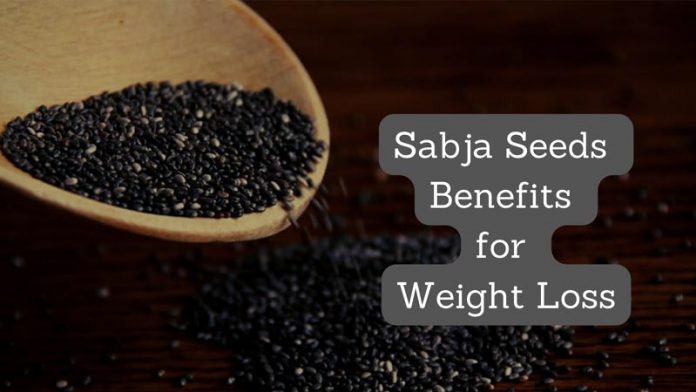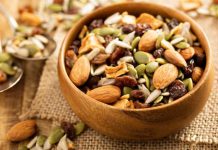Sabja seeds, also known as basil seeds or falooda seeds, are black seeds that resemble chia seeds and have several health advantages. Did you know that Sabja seeds are great for seasoning or producing fresh basil plants and are also packed with health benefits?
They are native to India and derived from Sweet Basil (and not Holy Basil, also known as Tulsi, which is more prevalent in India and extremely popular for its ability to bolster immunity).
Sabja in different Indian languages
- Hindi – तुलसी
- Gujarati – તુલસીનો છોડ
- Kannada – ತುಳಸಿ
- Malayalam – ബേസിൽ
- Telugu – బాసిల్
- Tamil – துளசி
Nutritional Facts For Sabja or Tulsi Seeds
Sabja seeds are high in nutrients and have immune-boosting qualities. They provide 42% carbs, 20% proteins, and 25% healthy fats and are low in calories. They’re an excellent source of fiber, Omega-3 fatty acids, minerals such as potassium, manganese, copper, calcium, and magnesium, as well as vitamins C and folate. As a result, they are appropriately dubbed ‘miracle seeds.’
Sabja Seeds Nutrition Facts (per 1 tablespoon or 13 grams)
| Basil constituents | Amount |
| Calories | 60 |
| Fats | 2.5 g |
| Omega-3 fatty acids | 1.240 g |
| Carbohydrates | 7 g |
| Protein | 2 g |
| Calcium | 15% of daily intake |
| Iron | 10% of daily intake |
| Magnesium | 10% of daily intake |
It also contains flavonoids and polyphenols.
Sabja seeds comparison with other foods commonly recommended for weight loss
| Nutrient (per 28g) | Sabja Seeds | Chia Seeds | Flax Seeds | Quinoa | Almonds |
|---|---|---|---|---|---|
| Calories | 42 | 137 | 152 | 120 | 161 |
| Protein | 1.4g | 4.7g | 5.2g | 4.4g | 6g |
| Fiber | 7.4g | 10.6g | 7.7g | 2.6g | 3.5g |
| Fat | 2g | 8.7g | 12.3g | 1.9g | 14g |
| Carbohydrates | 5.3g | 12.3g | 8.2g | 21g | 6g |
| Calcium | 17mg | 177mg | 26mg | 31mg | 76mg |
| Iron | 1.1mg | 1.6mg | 0.8mg | 1.5mg | 0.9mg |
| Magnesium | 21mg | 95mg | 58mg | 83mg | 76mg |
| Potassium | 116mg | 115mg | 118mg | 318mg | 207mg |
| Zinc | 0.3mg | 0.6mg | 0.4mg | 1.1mg | 0.9mg |
Are Sabja Seeds Good For Weight Loss?
According to recent research, these seeds help keep you full and prevent bingeing. Because of the constant and solid proof, basil seeds for weight loss have recently garnered enormous popularity.
Sabja seeds, high in alpha-linolenic acid, are well-known for their weight reduction effects. Because they are high in fiber, the sabja seeds keep you full for a long time, help to curb cravings, and aid in weight reduction.
How Sabja Seeds Aid Weight Loss?
Basil seeds are high in fiber, which keeps you feeling full for an extended period and protects you from overeating by suppressing your appetite. When soaked in water, sabja seeds swell up and release digestive enzymes. When consumed, these digestive enzymes lower your appetite and aid in the reduction of unpleasant cravings.
These seeds are abundant in nutrients such as calcium, magnesium, iron, phosphorus, and other multivitamins. They are also high in alpha-linolenic acid, which boosts your body’s fat-burning metabolism. The American Journal of Clinical Nutrition reports that consuming linolenic acid regularly helps reduce fat.
Ways To Eat Sabja Seeds For Weight Loss
Sabja seeds provide nourishment through smoothies, milkshakes, lemonade, soups, salad dressing, yogurt, pudding, oats, pancakes, spaghetti, baking bread, and muffins. When utilizing sabja seeds in baked items, crush them and replace a portion of the flour before adding them soaked.
Furthermore, soaking sabja seeds can substitute eggs in baked goods.
Must Read: Kiwi Fruit Benefits for Weight Loss
Ways To Add Sabja Seeds To Your Everyday Diet
Sabja seeds are versatile and find themselves in sweet and savory dishes. They have a mild flavour with a slightly nutty taste, which makes them the perfect addition to any meal.
Here Are Five Ways You Can Add Sabja Seeds To Your Everyday Diet
- Add them to your salads
- Sprinkle over roasted vegetables
- Use as a garnish on baked potatoes or other roasted vegetables
- Blitz them into a pesto sauce or use them as an alternative to pine nuts in pesto recipes
- Add them to curries and stir-fries
Sabja Seed Recipes for Weight Loss
1. Sabja Seed Lemonade
- Soak 1 tbsp of sabja seeds in water for 10 minutes.
- Mix 1 tbsp of lemon juice, 1 tbsp of honey, and 1 cup of water in a glass.
- Mix soaked sabja seeds with the lemonade and beat well.
- Serve chilled.
Nutritional Information (per serving): Calories: 60, Protein: 0.5 g, Carbohydrates: 16 g, Fat: 0.2 g, Fiber: 3.5 g
2. Mango Sabja Seed Pudding
Come April, and it is Mango season in India. The right time to try Mango Sabja seed pudding –
- Soak 2 tbsp of sabja seeds in water for 10 minutes.
- Blend one chopped mango, 1 cup of milk, and 2 tbsp of honey until smooth.
- Add the soaked sabja seeds to the blended mixture and mix well.
- Refrigerate for 30 minutes.
Nutritional Information (per serving): Calories: 270, Protein: 4 g, Carbohydrates: 40 g, Fat: 10 g, Fiber: 5 g
3. Sabja Seed Falooda
Want to fight heat outside with food? Try Sabja Seed falooda –
- Soak 2 tbsp of sabja seeds in water for ten min.
- Cook 1/2 cup of vermicelli noodles in boiling water till it is tender.
- Drain and rinse with cold water.
- In a glass, layer cooked noodles, 1 tbsp of sabja seeds, 1 tbsp of rose syrup, 1/2 cup of milk, and one scoop of vanilla ice cream.
- Repeat the layers.
- Serve chilled.
Nutritional Information (per serving): Calories: 350, Protein: 5 g, Carbohydrates: 54 g, Fat: 10 g, Fiber: 4 g
Other Benefits Of Sabja Seeds
1. Detoxification of Aids
Sabja seeds can cleanse the body and maintain it free of pollutants. This aids in the healthy functioning of our complete system, giving our skin brightness, reducing breakouts, and keeping it detoxified from within.
2. Skin Anomalies Are Treated
Sabja seeds’ antifungal qualities have helped treat skin conditions such as eczema and psoriasis. The seeds include plant compounds such as polyphenols, which can effectively influence critical cellular enzyme performance. Furthermore, Sabja seeds are an excellent source of vitamins and minerals and anti-microbial properties that protect the skin from microorganisms that cause chronic skin illnesses.
3. Improves Memory
Sabja seeds are high in tannins and terpenoids. They also contain high flavonoids, the most abundant phytonutrients that can help with memory issues. It has significant memory-enhancing benefits on the body and is also known for its anti-oxidative agents and antioxidant activity.
4. Fights Neuro Disorders
Studies show that sabja seeds, which are high in antioxidants, can help reduce the risk of neurodegenerative illnesses such as Parkinson’s and Alzheimer’s and relieve stress, migraine, depression, and mental tiredness.
5. Sabja For Skin And Hair
These tiny, crunchy seeds keep you physically and mentally well and give your skin and hair a brilliant glow. Sabja has long been used in numerous home treatments for healthy skin and hair growth.
6. Sabja Seeds in Ayurveda
Sabja seeds have been part of Ayurvedic medicine for over 1000 years. According to this traditional therapeutic practice, the seeds function as a natural cooler in the summer and pacify doshas associated with vata and pitta. It is an excellent diuretic for treating dysuria (pain and discomfort during urinating).
What are the benefits of drinking sabja water at night?
Sweet basil seeds or sabja seeds are beneficial when taken before bed. Here are some of the reasons to support it –
- Aids in Digestion: Sabja seeds is a natural laxative. They aid in digestion and help in resolving the constipation problem. The high amount of dietary fibre in it helps keep the stomach healthy.
- Regulating Blood Sugar Levels: Sabja seeds good for type 2 diabetics as they help in regulating blood sugar. Having sabja water after dinner can help in managing sugar levels.
- Weight Loss: Sabja seeds have plenty of fibres and therefore keep you feeling full for longer. Consuming the seeds at night reduces late-night snacking and aid in weight loss.
- Sleep: Some studies suggest that the seeds have sleep-prolonging effect, and contain sedative properties which help in inducing sleep when consumed before going to bed.
What are the differences between chia seeds and sabja seeds?
Below are some of the top differences between chia and sabja seeds in scannable table format:
| Factor | Chia Seeds | Sabja Seeds |
|---|---|---|
| Origin | Central and South America | India and the Middle East |
| Appearance | Grey with black and white spots, larger in size | Black and teardrop-shaped, smaller |
| Taste | Neutral | Slightly grassy |
| Nutrition | Rich in Omega-3, fibre, protein, and minerals | Rich in fibre, protein, carbs, essential fats, antioxidants |
| Health Benefits | Energy boost, stabilizes blood sugar, aids weight loss, improves brain function | Aids digestion, helps weight loss, controls blood sugar, improves skin and hair health |
| Usage | Direct or soaked | Soaked |
| Soaking Time | 20 minutes to 2 hours | About 15 minutes |
Conclusion
So, while these seeds benefit weight reduction, simply eating them will not suffice. Along with reaping the benefits of sabja seeds, the most effective technique would be to keep a good diet and exercise regularly.
Sabja Seeds For Weight Loss FAQs
1. When Should I Take Sabja Seeds For Weight Loss?
Traditional medicine recommends consuming soaked sabja seeds before meals as an appetite reducer. Because these seeds are rich in alpha-linolenic acid (ALA), they promote fat-burning metabolism in the body. It offers all of the body’s nutritional needs while being low in calories.
2. What Happens If We Drink Sabja Seeds Daily?
Sabja seeds are a vegetarian and natural source of protein. You may ingest these seeds regularly to strengthen bones, muscles, and skin and stimulate the synthesis of enzymes, hormones, and other bodily chemicals for improved body functioning.
3. Are Sabja Seeds Good For Females?
Sabja seeds are a great source of vitamins, minerals, and antioxidants, which makes them suitable for female health. They treat menstrual irregularities, insomnia, indigestion, nausea, and other related problems.
4. Is Sabja Good For The Skin?
Sabja delivers a tremendous amount of skin-loving nutrients to your diet. It’s high in vitamin E, beta-carotene, and zeaxanthin, all antioxidants that protect skin from free radicals. And its rich antioxidant value makes it an effective anti-aging food.
5. Do We Need To Chew Sabja?
You can drink sabja seeds or consume them straight, chew or swallow them without affecting the benefits.
5. Do sabja seeds help in weight gain?
Sabja seeds are rich in dietary fibre and contain protein and healthy fats. They are beneficial for weight loss and do not aid in weight gain. The dietary fibre content helps keep the person feeling full and helps curb overeating.










It is also safe to drink sabja water at night. In fact, drinking sabja water before bed may have some benefits, such as helping with digestion and promoting a feeling of fullness.
I was aware of the benefits of tulsi plant but was not knowing that it also helps in weeight loss. Thank you for the information. Will try it and will comment back if it helps.
I’m excited to try them out in different recipes and see if they really help with weight loss. I am sure they will not turn me into a basil plant though! It’s always great to discover new natural remedies.
It would be interesting to know more on the cultural and historical significance of Sabja seeds specially on Indian scenario. What are traditional uses or remedies associated with them.
You are a funny man 🙂 Good luck, and let us know how it was.